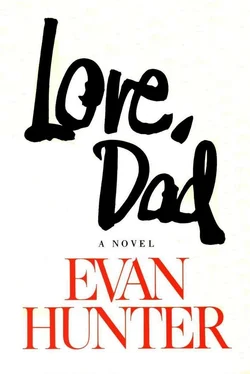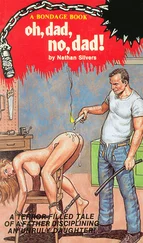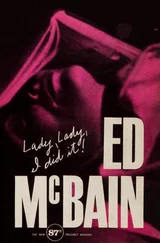THIS IS FOR
ALL THE SONS AND DAUGHTERS,
ALL THE MOTHERS AND FATHERS
Mac Arthur Park is melting in the dark
All the sweet green icing flowing down
Someone left the cake out in the rain
And I don’t think that I can take it
’Cause it took so long to bake it
And I’ll never have the recipe again
Oh no
Oh no.
Jimmy Webb
Jamie was still working at midnight, hanging the matted enlargements on every available inch of wall space, using double-faced Scotch tape for the plaster surfaces and pushpins for the old wooden beams. His daughter had gone to bed at ten-thirty, serene in the knowledge that the birthday tradition would be honored yet another time — but he alone knew that this year the shared secret would carry with it a true surprise.
He had started putting up his photographs of her when she was a year old and couldn’t possibly have understood that all those black-and-white enlargements on the walls were pictures of herself, taken over the past year. See the baby, Lissie? Who’s the pretty baby? Holding her in his arms, her chubby little hand reaching out, one stubby forefinger touching the nose of the baby on the wall. Yes, darling, that’s you, darling. But not understanding at all. The pictures hadn’t even been matted that first year; there simply hadn’t been enough extra cash to buy mats for the four dozen enlargements he’d hung all over the living room. That was in 1952, a year before he’d broken through with the photographic essay for Life.
On December 18,1953, the night before Lissie’s second birthday, he hung the enlargements he’d been working on all that week. Tradition — it had become tradition in the short space of two years — demanded that he perform the task alone, without assistance from Connie, unlike their annual Christmas Eve efforts. That year, the enlargements were matted. He had trimmed off the white margins left by the enlarger easel, and then had mounted the pictures with rubber cement — he’d ordered a hot mounting press, but it had not yet been delivered — cutting the mats himself from a lightweight but pure rag stock of Bristol board. He cut most of the mats to accommodate eight-by-tens, but there were several larger pictures as well — at least a dozen eleven-by-fourteens, and one poster-size picture he’d had blown up and printed commercially, the best picture he’d taken of Lissie that year. It showed her looking down in consternation at a sand-covered lollipop, her blue eyes squinted, her blond hair catching the sun for a dazzling halo effect. He’d taken it with the Leica on a bright August day at Jones Beach using Kodak Plus-X and shooting with an f:8 opening at 1/250of a second.
That year, she knew who she was. She stood puzzled in the center of the living room, wearing damp Dr. Denton’s — she still wasn’t toilet-trained and Connie’s constant joke was that one day she’d have a college-girl daughter who still wet her pants — and then she waddled from picture to picture, beginning to get the message, her eyes sparking with intelligence; these were pictures Daddy had taken; this was her birthday, and on her birthday, Daddy put up pictures of her. When she saw the poster-size shot of her squinting at the lollipop, she squealed with glee, remembering, and ran to him and hugged his knees. He lifted her into his arms and kissed her plump little cheeks and whispered into her hair, “Daddy loves you.”
This year, Lissie would be seventeen — and Jamie was breaking with tradition. The unspoken codicil dictated that the pictures he hung were to be only those taken of her in the previous year. But tomorrow she would be seventeen, and surely seventeen demanded something a bit more earthshaking. He should have done this last year, in fact, when she’d turned sixteen; sixteen was a milestone year. But they had just moved into the Rutledge house then, and the place was in total chaos, and there was no time for something as grandiose as what he was doing tonight. He had over the past several weeks gone back through his files for the last sixteen years, selecting three representative photographs for each year, and had added to them a dozen new pictures taken since the beginning of 1968, for a total of sixty pictures of various sizes, five of them the same poster size as the one of Lissie when she was twenty months old and squinting askance at a sandy lollipop. The problem now was where to hang them all.
The living room in the Connecticut house was nowhere near as large as the one on Central Park West had been. They’d discovered the converted sawmill completely by chance a little more than a year ago, on a visit to Rutledge to see a television producer named Lester Blair. This was in October, and fifteen-year-old Lissie — almost sixteen, in fact — was away at school suffering through what was officially called an academic weekend, but which she and her roommate referred to as an “anemic weekend.” The suffering had, in fact, been more imaginary than real. Jamie and Connie had driven up from New York on Saturday to take her to dinner, had spent the night in a motel outside New Haven, and had taken her to lunch that afternoon before driving down to Rutledge. The Henderson School was in a Connecticut town called Shottsville (which all the kids at school called Shitsville, naturally) only some twenty minutes beyond New Haven on the Merritt Parkway, but Lissie nonetheless complained constantly that she never got to come home except on so-called long weekends, which official terminology she maintained was a prime example of hyperbole, a figure of speech she’d picked up in her sophomore English class.
The initial choice had been to send her to a public middle school in the city — dread thought — or to any one of several good private schools within busing distance. But the two schools they were seriously considering had long waiting lists, and they learned from a friend that the third contender was really mediocre. They were suddenly confronted with the previously unthinkable possibility of having to send Lissie away from home in order to guarantee the education they felt she should have. They made their decision premised on a map of New York City and its environs, drawing on it a circle with a 150-mile radius, and finally settling on the Henderson School, which was little more than two hours away by car, and which had an excellent record of college placement and a reputedly fine speech and dramatics department. Lissie had till then shown neither the talent nor the inclination to pursue a theatrical career, but Connie — admittedly biased — insisted that good speech was the hallmark of a good education. Not for nothing had she herself been a speech and dramatics major at Vassar; neither for nothing had she finally obtained her master’s degree in speech pathology at Columbia University.
They arrived in Rutledge after lunch that fall Sunday to discuss the possibility of doing a half-hour Christmas special utilizing a portfolio of stills Jamie had shot on Fifth Avenue the Christmas before. A dozen of these had appeared in Life under the title “White Christmas in a Gray City,” and his agent, Lew Barker, had sold another four to Ladies’ Home Journal , but Jamie had shot eight full rolls of film, which he felt, immodestly, captured the very essence of the city at the peak of the holiday season. It was Lester Blair’s opinion that the pictures wouldn’t need an accompanying story: a simple connecting monologue would suffice. Of the 288 pictures Jamie had developed and printed — he still did all his own developing, though he knew many professional photographers who preferred leaving the donkey work to labs like Modern Age and Compo — half of them were superb (in his own estimation), a quarter of them were excellent, and the rest were junk. Blair wanted to pace the pictures some ten seconds apart, six shots to a minute, for a total of 180 pictures in the half-hour. He told Jamie he would try to get somebody like Gregory Peck or Charlton Heston to do the connecting monologue, which he himself wanted to take a shot at writing, but that they’d probably end up with some very good New York actor instead, since there wasn’t much money involved in public television. But he felt this was something well worth doing, and he ended his pitch by saying he thought the prestige value to Jamie would be enormous.
Читать дальше












